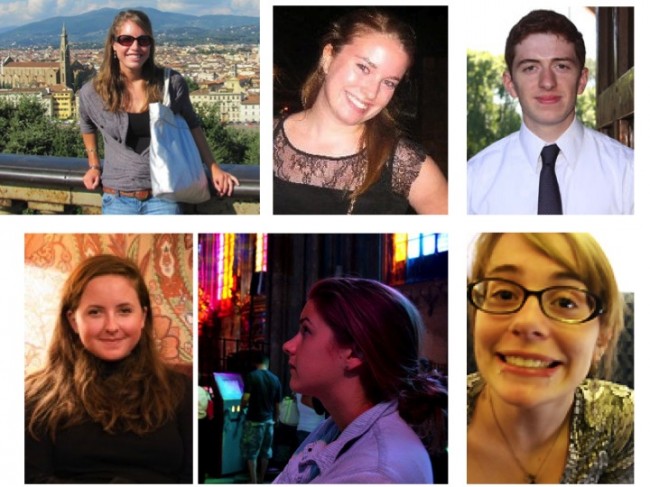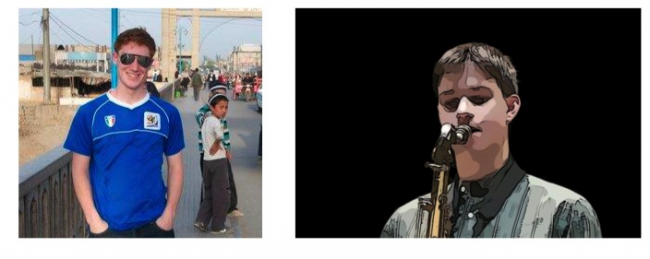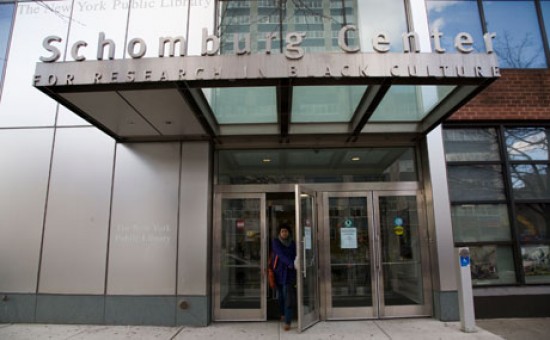Home » Research (Page 3)
Category Archives: Research
Class of 2013 History Prizes at 63rd Annual Honors Day

“HARTFORD, CT, May 3, 2013 – The Trinity College Chapel served as the site Friday, May 3 for the school’s 63rd annual Honors Day Ceremony in which more than 200 students were cited for their scholarly, athletic and community-oriented achievements. Some students were recognized more than once. The honorees, which included members of the Classes of 2013, ’14, ’15 and ’16, were presented with a broad array of prizes and awards for their contributions and accomplishments over the years. The ceremony originated when George Keith Funston, who served as Trinity College President from 1945 to 1951, sought to re-establish the school’s academic pageantry, which had been halted during World War II. Matriculation and the Book Ceremony for first-year students were restored, and in the spring of 1950, Honors Day was added as a new event. It was intended to be an occasion when all Trinity prizes and awards — with the exception of those handed out at Commencement – could be celebrated in the presence of the entire College community.” (source: http://www.trincoll.edu/NewsEvents/NewsArticles/pages/HonorsDay2013.aspx)
Congratulations to all of the following the history majors awarded prizes:
(more…)
Senior Thesis 2013 Presentations

On Thursday, May 2nd,four history senior thesis writers presented their research findings to the department. Also in attendance were retired distinguished history professors Painter and Chatfield. The presentations were moderated by Michael Lestz, Chair, and Prof. Cocco, faculty thesis supervisor.
In order of appearance:
(more…)
The Frailty of Historical Truth: Learning Why Historians Inevitably Err
 By David Lowenthal “How tiresome are the endless anecdotes about [William Best] Hesseltine, his seminar, and his students,” wrote Wisconsin editor Paul Hass.1 Yet the unsung historiographical lessons that seminar imparted to me and others richly merit recording. By scanning our mentors’ publications in skeptical depth, students learned that hidden bias always skews evidence, that secondary sources are ipso facto unreliable, and that myriad minor errors betoken major sins. Still more, they learned that even paragons do not have enough time, patience, or probity to prevent all such lapses and avoid their egregious epistemic consequences. Historians ever stumble on feet of clay. How tiresome are the endless anecdotes about [William Best] Hesseltine, his seminar, and his students,” wrote Wisconsin editor Paul Hass.1 Yet the unsung historiographical lessons that seminar imparted to me and others richly merit recording. By scanning our mentors’ publications in skeptical depth, students learned that hidden bias always skews evidence, that secondary sources are ipso facto unreliable, and that myriad minor errors betoken major sins. Still more, they learned that even paragons do not have enough time, patience, or probity to prevent all such lapses and avoid their egregious epistemic consequences. Historians ever stumble on feet of clay. At the University of Wisconsin from 1932 until his death in 1963, Hesseltine was a renowned chronicler of the Civil War and its aftermath, whose “commandments” on historical writing are still often cited. His anathemas forbade the passive voice, the present tense, designating persons by their last names only, and quoting from secondary sources. He inveighed against the rising tide of pompous impedimenta: “do not discuss thy methodology”; “write about thy subject and not about the documents concerning thy subject”; “fight all thy battles in the footnotes.” And––pertinent in today’s Wiedergutmachung spate of apology, tempting historians to turn moralist—”thou shalt not pass judgments on mankind in general nor … pardon anyone for anything.” 2 A retrospective celebrant prized Hesseltine’s “strange blend of pacifism, anarchism, Menckenism, Calvinism, and sheer naked perversity.”3”
By David Lowenthal “How tiresome are the endless anecdotes about [William Best] Hesseltine, his seminar, and his students,” wrote Wisconsin editor Paul Hass.1 Yet the unsung historiographical lessons that seminar imparted to me and others richly merit recording. By scanning our mentors’ publications in skeptical depth, students learned that hidden bias always skews evidence, that secondary sources are ipso facto unreliable, and that myriad minor errors betoken major sins. Still more, they learned that even paragons do not have enough time, patience, or probity to prevent all such lapses and avoid their egregious epistemic consequences. Historians ever stumble on feet of clay. How tiresome are the endless anecdotes about [William Best] Hesseltine, his seminar, and his students,” wrote Wisconsin editor Paul Hass.1 Yet the unsung historiographical lessons that seminar imparted to me and others richly merit recording. By scanning our mentors’ publications in skeptical depth, students learned that hidden bias always skews evidence, that secondary sources are ipso facto unreliable, and that myriad minor errors betoken major sins. Still more, they learned that even paragons do not have enough time, patience, or probity to prevent all such lapses and avoid their egregious epistemic consequences. Historians ever stumble on feet of clay. At the University of Wisconsin from 1932 until his death in 1963, Hesseltine was a renowned chronicler of the Civil War and its aftermath, whose “commandments” on historical writing are still often cited. His anathemas forbade the passive voice, the present tense, designating persons by their last names only, and quoting from secondary sources. He inveighed against the rising tide of pompous impedimenta: “do not discuss thy methodology”; “write about thy subject and not about the documents concerning thy subject”; “fight all thy battles in the footnotes.” And––pertinent in today’s Wiedergutmachung spate of apology, tempting historians to turn moralist—”thou shalt not pass judgments on mankind in general nor … pardon anyone for anything.” 2 A retrospective celebrant prized Hesseltine’s “strange blend of pacifism, anarchism, Menckenism, Calvinism, and sheer naked perversity.”3”
[From The Art of History column in the March 2013 issue of Perspectives on History]
Prof. Antrim’s “Mapping the Middle East” featured on the Watkinson Library’s Blog

Originally posted on The Bibliophilie’s Lair: The serendipitous discovery of COOL STUFF in the Watkinson
“Several days ago we hosted professor Zayde Antrim’s “Mapping the Middle East” class. The students pick a historical atlas and answer a questionnaire about aspects of what they see. Here is the course description: “This course approaches the history of the Middle East through maps. It will look at the many different ways maps have told the story of the territory we now call the Middle East and the many different points of view that have defined it as a geographical entity. Readings will analyze maps as social constructions and will place mapmaking and map-use in a historical context. We will relate maps to questions of empire, colonialism, war and peace, nationalism, and environmental change.””
Check out The Bibliophile’s Lair HERE.
Meet Team Thesis AY2012/13
 By: Daniel Morgan (History major, Class of 2013)
By: Daniel Morgan (History major, Class of 2013)
Is there anything more quintessential to the education of young historians than the thesis exercise? Writing a two semester thesis has long been a staple of the liberal arts curriculum, and rightly so. Through this labor of love, a history major puts all of his or her skills to the test (from critical and analytical reading to the development of a cogent and articulate argument) and ultimately produces a work which adds to the collective body of Trinity scholarship. The History Department thesis writers for the class of 2013 are (alphabetical by last name): Kyle Loder, Kathleen McKenna, Francis Russo, and Emma Sternloff. This writer is also a thesis writer for the 2013 year – however, I would like to step back after this brief introduction, and let my colleagues speak for themselves. I have asked each of this year’s thesis writers to comment briefly on writing a history thesis, as well as their opinions on history scholarship in general.
(more…)
Into the Archives: CT Historical Society Research Center

By: Emma Sternloff (History major, Class of 2013)
My visit to the Connecticut Historical Society Research Center with Professor Wickman and Francis Russo offered a unique opportunity to connect with my thesis subject. I’m writing about James Hammond Trumbull, a nineteenth-century scholar and the first librarian of the Watkinson Library, and his study of Native American history and language. Trumbull was a polymath, interested in everything from botany to bibliography, but he had a particular passion for Connecticut’s colonial past. Accordingly, he was an enthusiastic member of the Connecticut Historical Society, joining the organization in 1847 and serving as president from 1863 to 1889. Given Trumbull’s long-standing connection to the CHS, I had high hopes for the archives, and I was not disappointed. I came across several Civil War-era letters written to Trumbull in his capacity as Connecticut’s Secretary of State.
(more…)
Honors Day – History Students Recognized
 “Following World War II, President Funston encouraged reestablishment of the College’s academic pageantry, which had been curtailed during the war. Matriculation and the Book Ceremony for first-year students were both brought back, and, in the spring of 1950, Honors Day was added as a new ceremony. Honors Day was intended to be an occasion when all Trinity prizes and awards—with the exception of those given out at Commencement—could be celebrated in the presence of the entire College community.” Ten history student majors were awarded prizes for community service and academic scholarship. Congratulations to Virgilio Bissio, Erin Dorsey, Paige Durgin, Brooke Grasberger, Joseph Laws,, Michael McLean, Mixashawn Rozie, Francis Russo, Carolyn Taratko, and Adam Whitehurst.
“Following World War II, President Funston encouraged reestablishment of the College’s academic pageantry, which had been curtailed during the war. Matriculation and the Book Ceremony for first-year students were both brought back, and, in the spring of 1950, Honors Day was added as a new ceremony. Honors Day was intended to be an occasion when all Trinity prizes and awards—with the exception of those given out at Commencement—could be celebrated in the presence of the entire College community.” Ten history student majors were awarded prizes for community service and academic scholarship. Congratulations to Virgilio Bissio, Erin Dorsey, Paige Durgin, Brooke Grasberger, Joseph Laws,, Michael McLean, Mixashawn Rozie, Francis Russo, Carolyn Taratko, and Adam Whitehurst.
List of Award Winners & Awards:
(more…)
Meet Team Senior Thesis


By Jacob Pronit (Class of 2012)
Seniors are busy people but seniors who write theses are really busy people. Thankfully, because they are super nice and wonderful, each senior history author took a couple minutes to write a short profile for the history blog. We hope you like our questions and their answers!
(more…)
Schomburg Thesis Research with Prof. Markle
“Yesterday, Professor Markle took me to the Schomburg Center in New York City. Located in Harlem, the Schomburg is one of America’s best repositories of African Diaspora sources. I did research for my senior thesis, and Professor did some research for his book.” Continue reading HERE:
